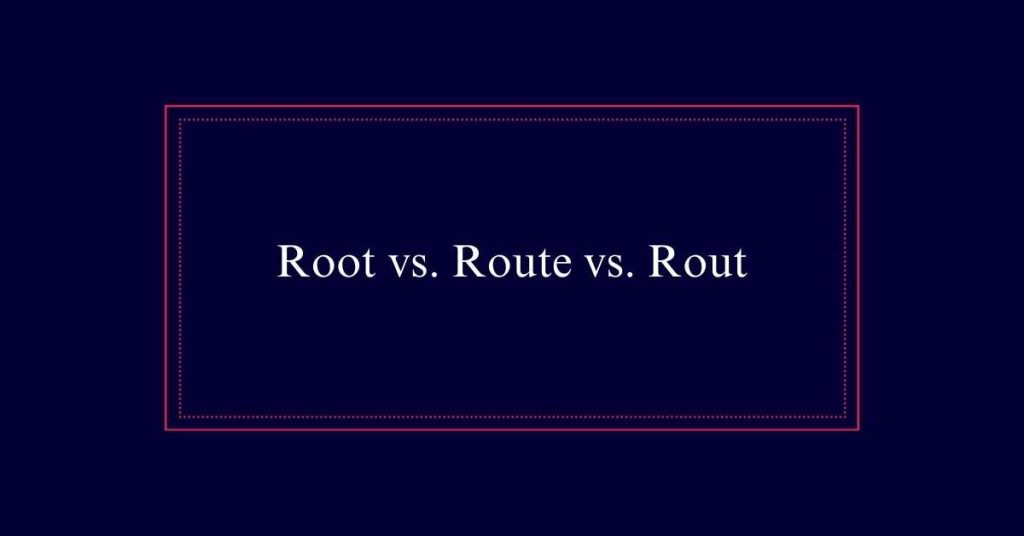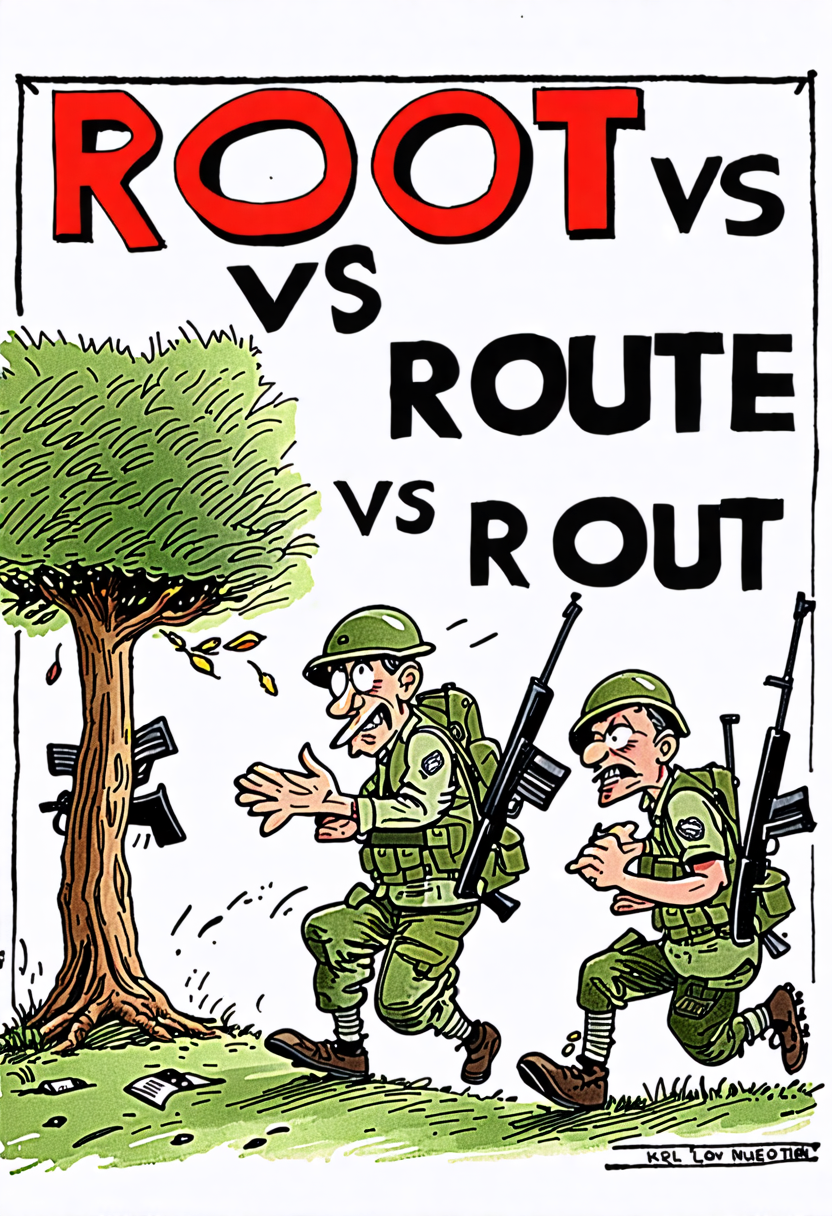Root vs. Route vs. Rout
‘Root,’ ‘route,’ and ‘rout’ have distinct meanings. ‘Root’ refers to the underground part of a plant or the main cause of something. As a verb, it means to grow roots or to eliminate. ‘Route’ denotes a path or way between two places, or the act of sending something along a specific path. ‘Rout’ refers to a disorderly retreat or a significant defeat and can describe causing such a retreat or defeat.
Definitions of “Root”
‘Root’ has multiple definitions, each varying based on its use as a noun or verb.
As a noun, ‘root’ refers to the underground part of a plant. It can also mean the cause or foundation of something. For example, ‘the root of the problem’ indicates the fundamental cause.
As a verb, ‘root’ describes the process of growing roots or establishing a base. It can also mean removing something entirely, such as ‘rooting out corruption.’ Additionally, it refers to digging with a snout, as pigs do.
Ultimately, ‘root’ can mean cheering loudly for someone or something, as in ‘rooting for a team.’
Definitions of “Route”
As a noun, ‘route’ refers to a path or way between two places. For instance, a traveler might choose the fastest route to their destination. This term is commonly used in transportation and navigation contexts.
As a verb, ‘route’ means to send something along a specific path. For example, mail can be routed through different locations before reaching its final address. This usage is often seen in logistics and communication fields.
In both forms, ‘route’ emphasizes direction and movement, highlighting how something or someone gets from one point to another.
Definitions of “Rout”
Although less commonly used, ‘rout’ has distinct meanings as both a noun and a verb.
As a noun, ‘rout’ refers to a disorderly retreat or a state of confusion. For example, in military contexts, a defeated army might fall into a rout. It can also describe a chaotic situation, such as a financial market experiencing a dramatic downturn.
As a verb, ‘rout’ means to cause a disorderly retreat or to defeat decisively. For instance, in sports, one team might rout another by winning with a large margin.
“Root” as a Noun
What exactly does ‘root’ signify when used as a noun?
Primarily, ‘root’ refers to the underground part of a plant that absorbs water and nutrients. It anchors the plant and is essential for its growth.
Besides its botanical meaning, ‘root’ can also denote the fundamental cause or origin of something. For instance, one might say, ‘The root of the problem lies in poor communication.’
Additionally, ‘root’ can refer to the attached or main part of something, such as the root of a tooth.
Essentially, the noun ‘root’ is used to describe foundational aspects, whether in nature or as a metaphor for underlying causes or essential parts in various contexts.
“Root” as a Verb
As a verb, ‘root’ encompasses several actions, including growing roots, establishing a foundation, and removing something entirely.
Firstly, to ‘root’ in the agricultural sense means for a plant to develop roots. This is essential for its growth and stability.
Secondly, ‘to root’ can mean to establish something firmly, as in ‘The policy is rooted in strong principles.’
Thirdly, it can mean to remove something by its roots, often used in the context of eliminating problems, like ‘to root out corruption.’
Lastly, ‘rooting’ can refer to digging with a snout, as animals do when searching for food.
Each use highlights the versatility of ‘root’ as a verb in different contexts.
“Route” as a Noun
A ‘route’ as a noun refers to a specific path or course taken to travel from one place to another. This term is commonly used in transportation and navigation contexts. For instance, drivers might choose the fastest route to avoid traffic, while hikers might follow a trail route marked on a map.
Routes can be physical, like highways and pathways, or conceptual, such as a planned itinerary for a trip. The word is also used in logistics to describe the path goods take from production to the consumer. In technology, data packets follow routes across networks to reach their destination.

“Route” as a Verb
In addition to describing a path, ‘route’ as a verb means to send something along a specific path or direction. It is commonly used in logistics, telecommunications, and navigation. When you route a package, you determine its journey from sender to recipient. In a network, data is routed through various nodes to reach its destination.
Here is a table to illustrate different uses of ‘route’ as a verb:
| Context | Example |
|---|---|
| Logistics | “They routed the shipment through Chicago.” |
| Telecommunications | Calls were routed via satellite. |
| Navigation | “The GPS routed us around the traffic jam.” |
| Information Technology | “Emails are routed through secure servers.” |
| Customer Service | “Calls are routed to the appropriate department.” |
“Rout” as a Noun
Rout as a noun refers to a chaotic and disorderly retreat or a state of confusion. It is often used in military contexts to describe troops fleeing in panic after a defeat. For example, ‘The army was in a complete rout after the surprise attack.’
Beyond military use, it can signify any situation of disarray and turmoil. In financial markets, a rout can describe a significant and rapid decline in stock prices. For instance, ‘The stock market experienced a rout, leading to widespread panic among investors.’
“Rout” as a Verb
‘Rout’ as a verb means to cause a group to retreat in a disorderly fashion or to defeat them thoroughly. This term is often used in military contexts where one force overwhelms another, leading to a chaotic withdrawal. For instance, an army can rout its enemy, causing them to flee in confusion.
In broader usage, ‘rout’ can describe any situation where a group or individual is decisively beaten. This could apply to sports, business, or other competitive fields. When one team routs another, it means they have won with such dominance that the losing side is left in disarray.
Usage Examples
Examples of ‘root,’ ‘route,’ and ‘rout’ illustrate the distinct meanings and contexts in which these words are used. Understanding these differences is essential for accurate communication. Here are a few examples:
Root:
- _Noun_: ‘The tree’s roots were deep underground.’
- _Verb_: ‘She rooted herself in the community.’
Route:
- _Noun_: ‘We took the scenic route home.’
- _Verb_: ‘The packages were routed through Chicago.’
Rout:
- _Noun_: ‘The army’s rout was complete.’
- _Verb_: ‘The team routed their opponents.’







